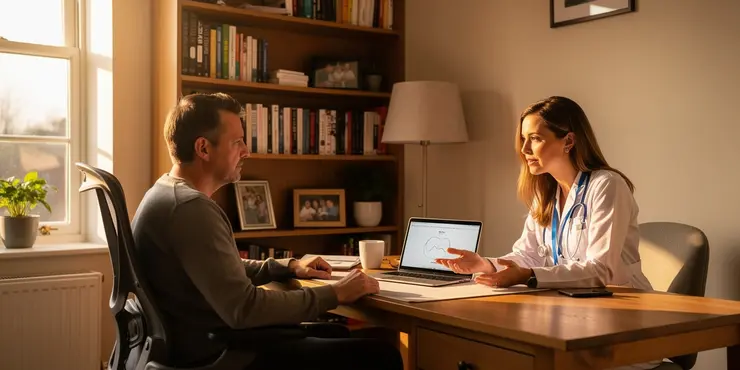
Find Help
More Items From Ergsy search
-
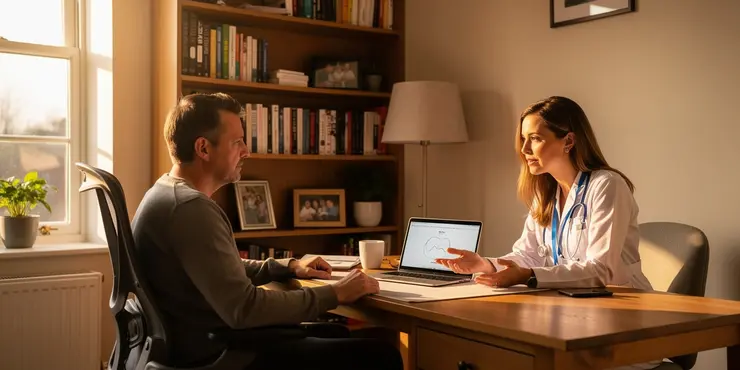
How is sleep apnea diagnosed?
Relevance: 100%
-
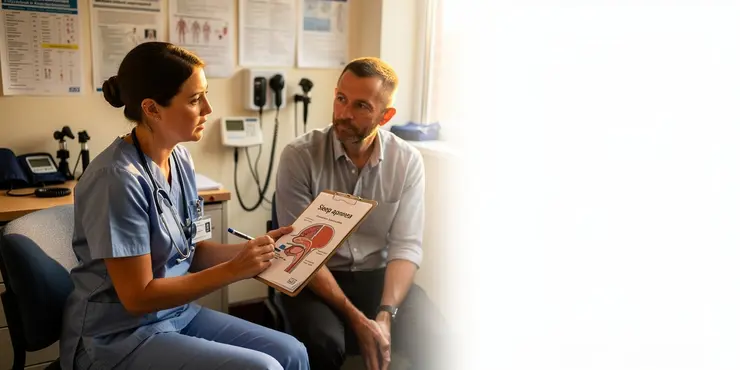
What is sleep apnoea?
Relevance: 97%
-
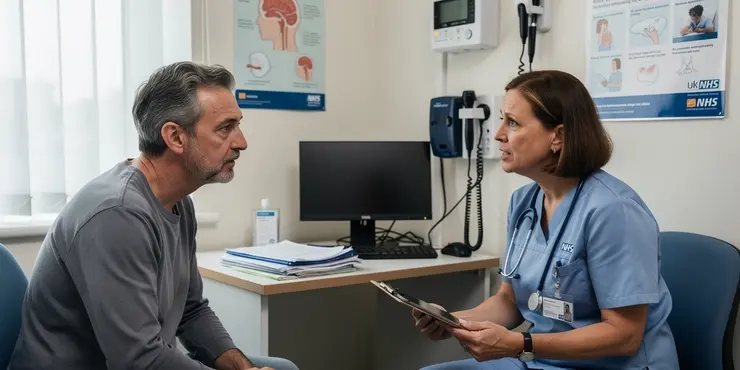
What is sleep apnea?
Relevance: 97%
-
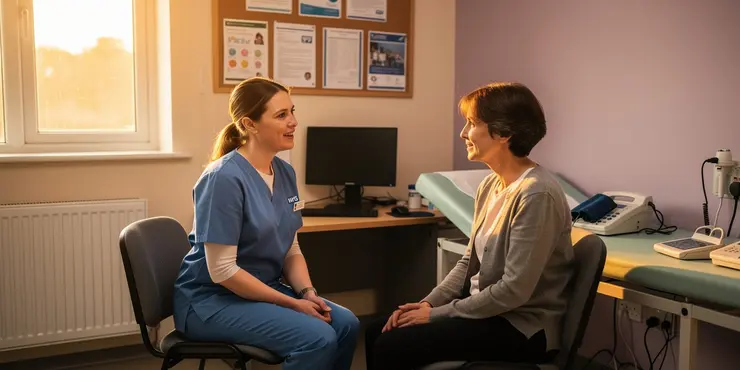
Why is sleep apnea dangerous?
Relevance: 94%
-
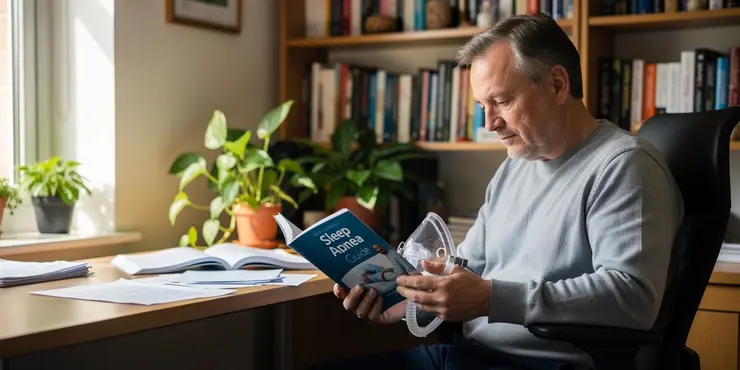
What is complex sleep apnea syndrome?
Relevance: 94%
-
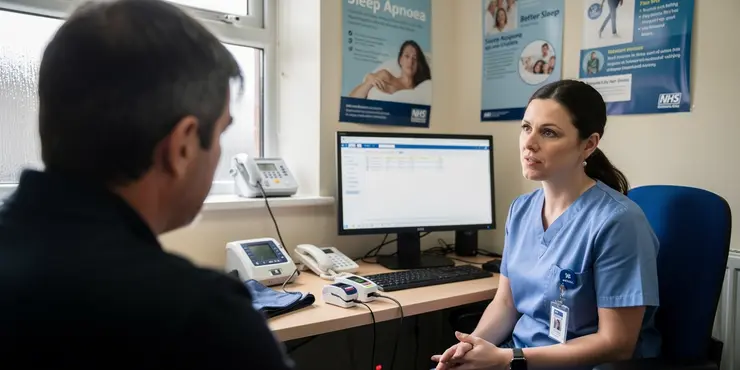
How common is sleep apnea?
Relevance: 93%
-
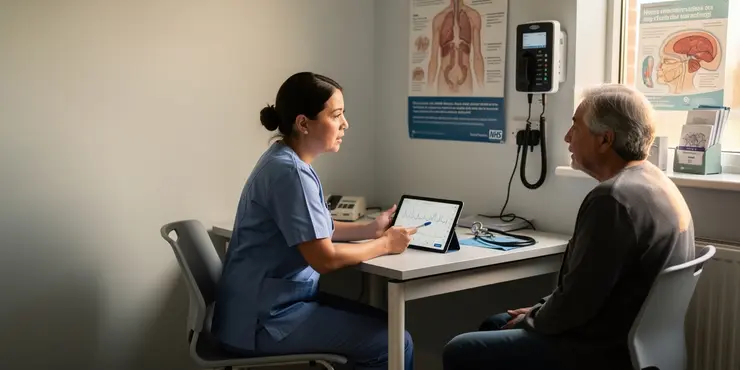
Can sleep apnea be cured?
Relevance: 93%
-
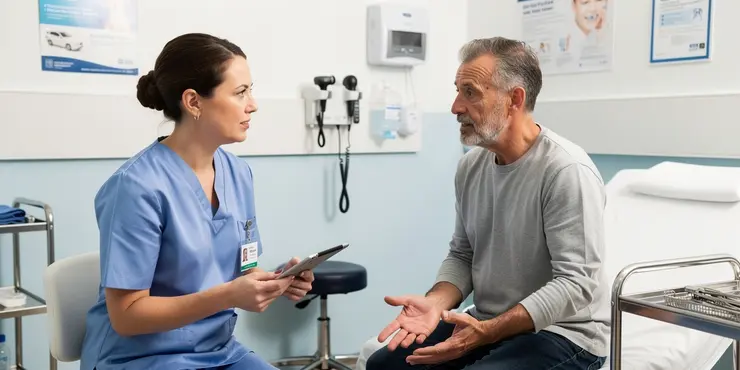
What are the main types of sleep apnea?
Relevance: 91%
-
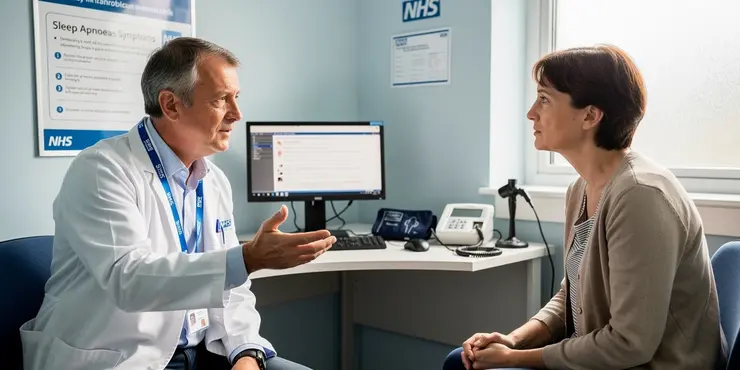
What are common symptoms of sleep apnea?
Relevance: 91%
-
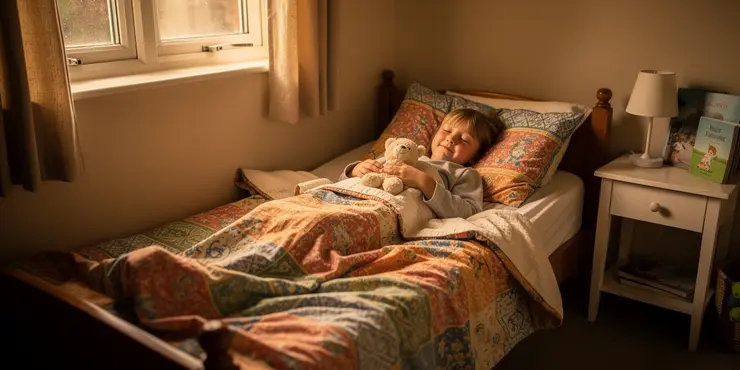
Can children have sleep apnea?
Relevance: 90%
-
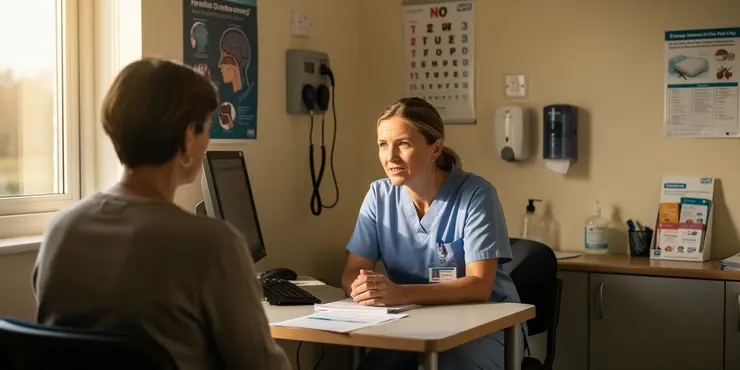
Does sleep apnea occur only in adults?
Relevance: 90%
-
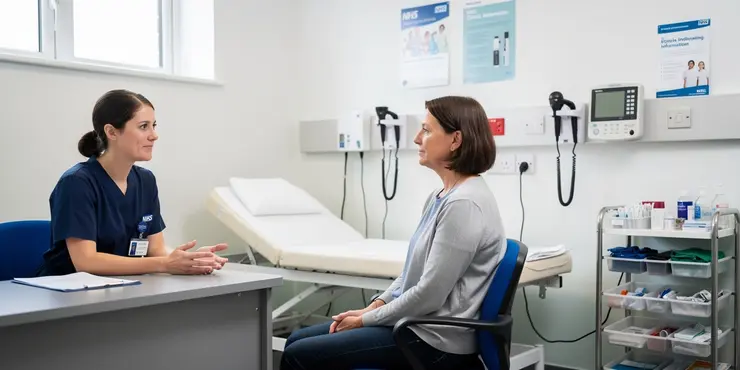
What is complex sleep apnea syndrome?
Relevance: 90%
-
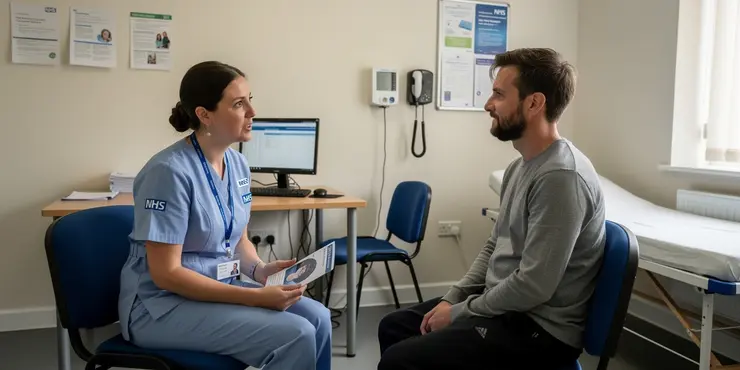
Is CPAP the only treatment for sleep apnea?
Relevance: 88%
-
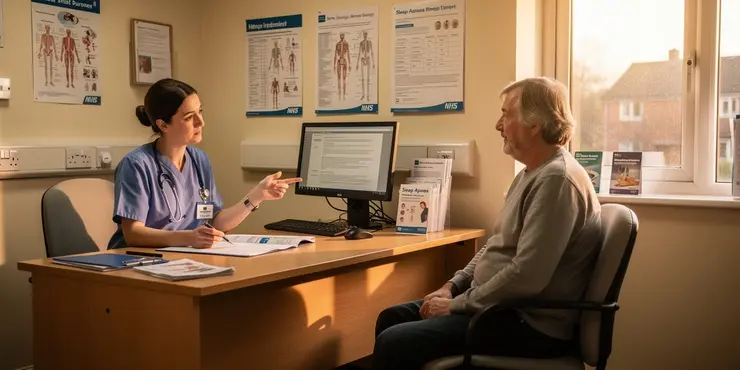
What treatments are available for sleep apnea?
Relevance: 88%
-
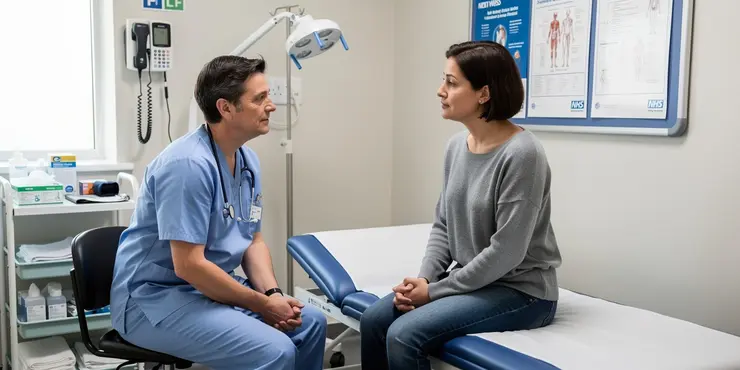
What should I do if I suspect I have sleep apnea?
Relevance: 88%
-
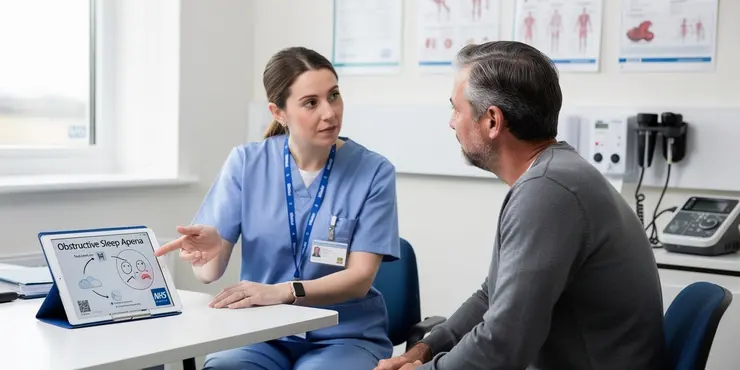
What causes obstructive sleep apnea?
Relevance: 87%
-

What are risk factors for developing sleep apnea?
Relevance: 87%
-
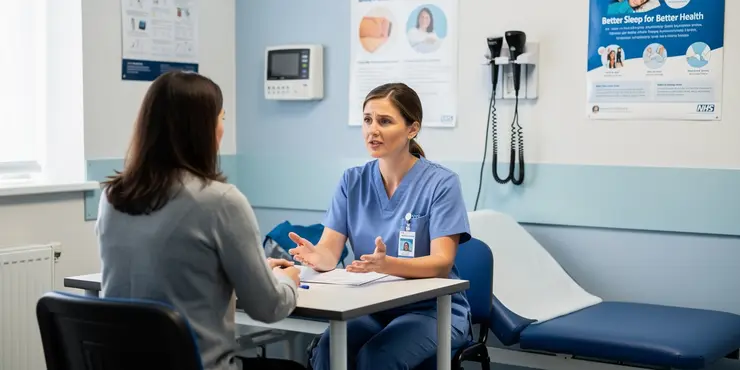
Can alcohol worsen sleep apnea?
Relevance: 86%
-
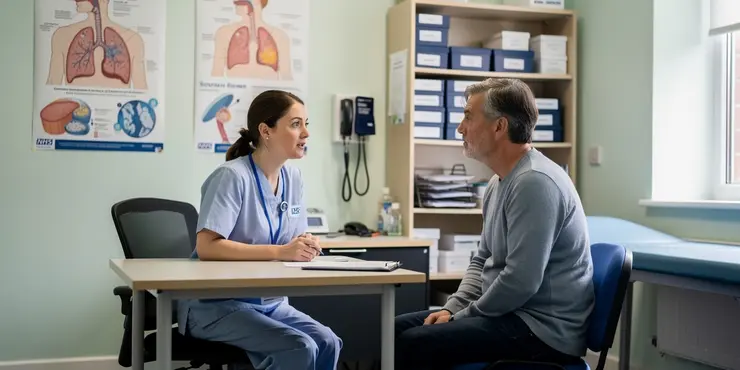
Is snoring always a sign of sleep apnea?
Relevance: 85%
-
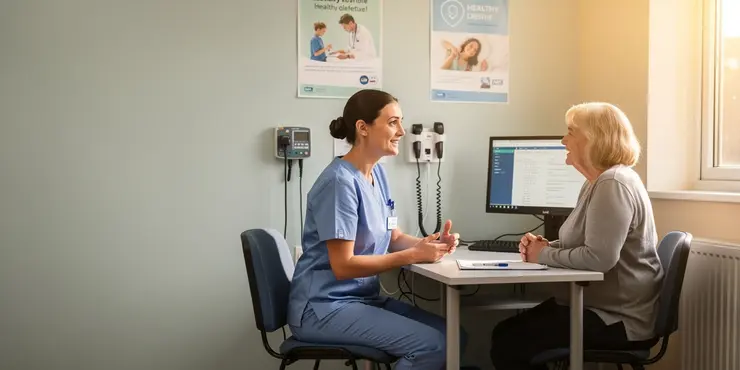
Can weight loss improve sleep apnea?
Relevance: 83%
-
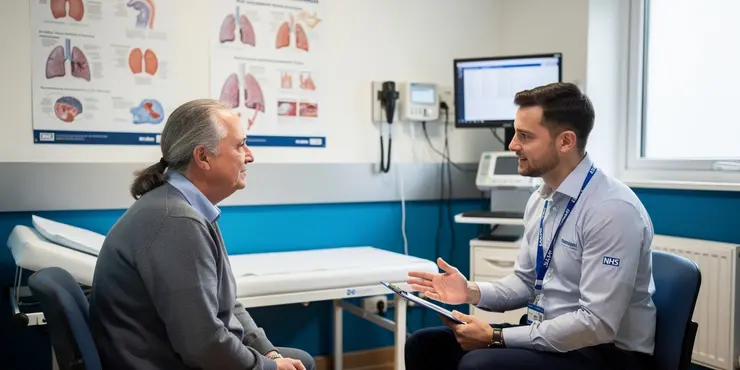
Am I eligible to try the new sleep apnea chip?
Relevance: 82%
-
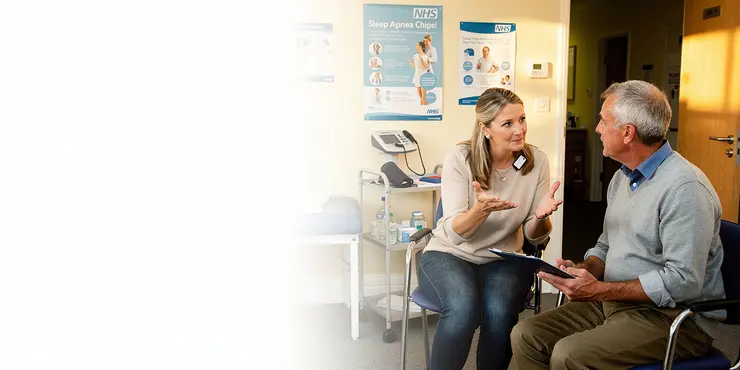
How does the new Sleep Apnea Chip work?
Relevance: 79%
-
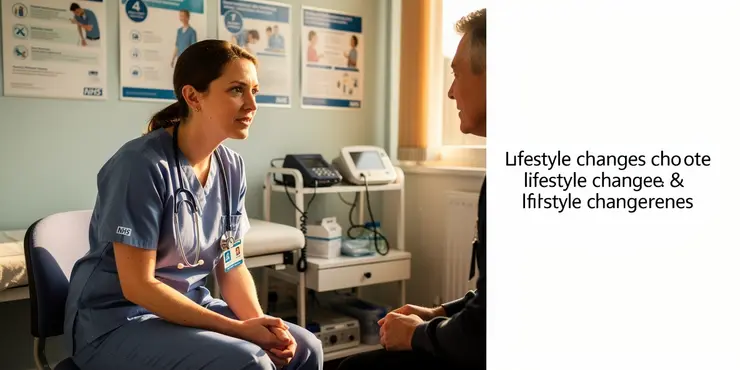
What lifestyle changes can help manage sleep apnea?
Relevance: 78%
-
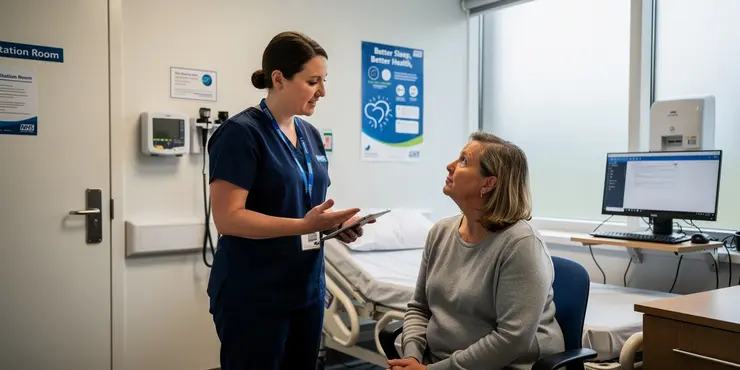
Introduction to obstructive sleep apnoea
Relevance: 71%
-
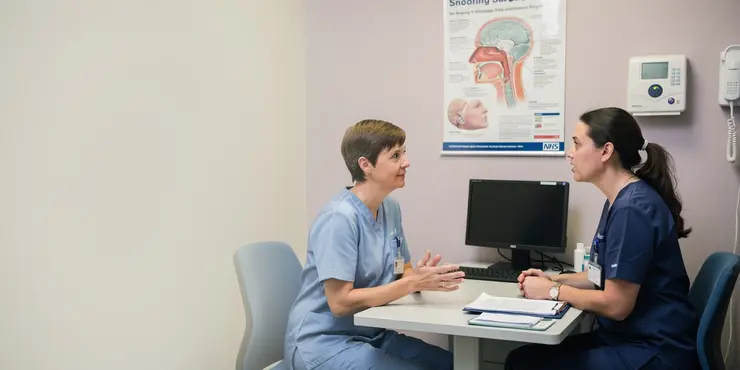
Evidence-Based Interventions: snoring surgery in the absence of Obstructive Sleep Apnoea (OSA)
Relevance: 60%
-
What is sleep apnoea?
Relevance: 48%
-
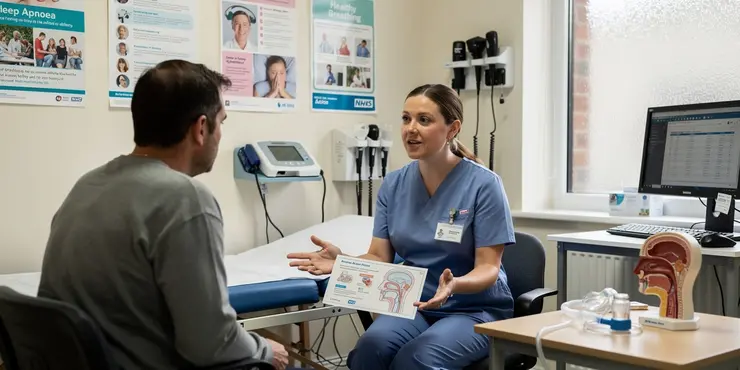
How does central sleep apnea differ from obstructive sleep apnea?
Relevance: 43%
-
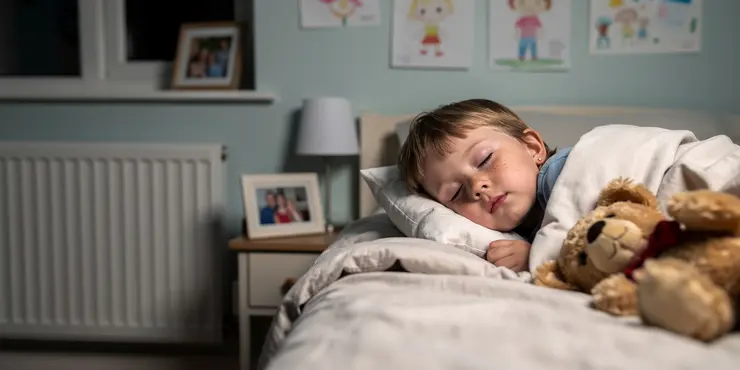
The Importance of Sleep for All Ages
Relevance: 39%
-
How does sleep quality relate to menopause symptoms?
Relevance: 38%
-
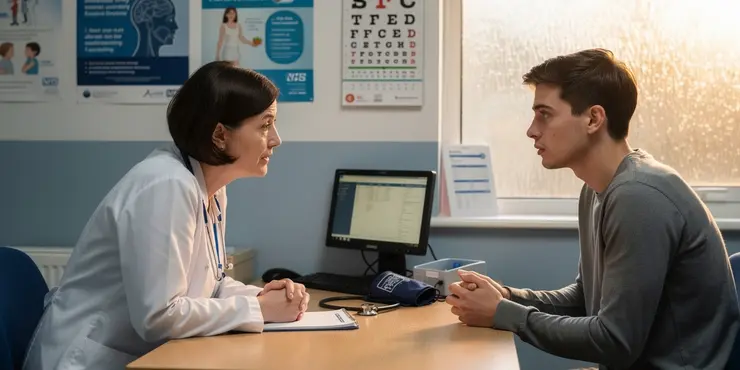
BSL - Diagnosis of panic disorder
Relevance: 37%
-
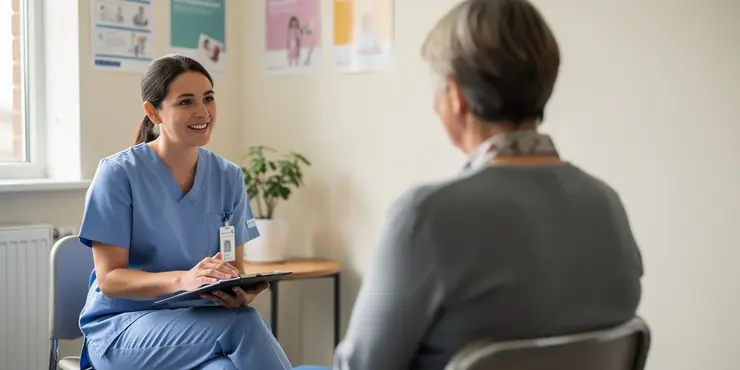
Does screen time affect both sleep onset and sleep maintenance?
Relevance: 36%
-
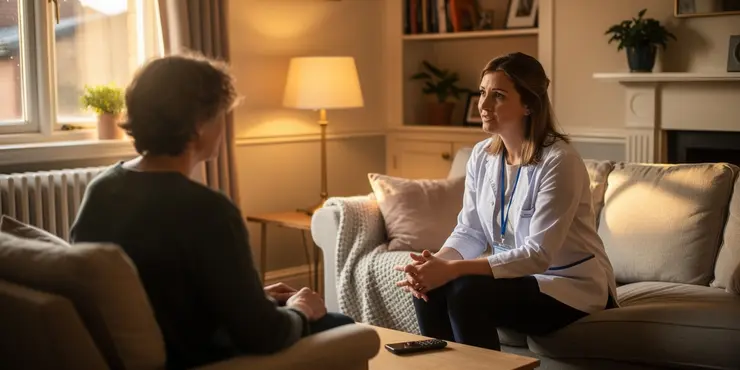
Top Tips to Help You Get a Good Nights Sleep
Relevance: 36%
-
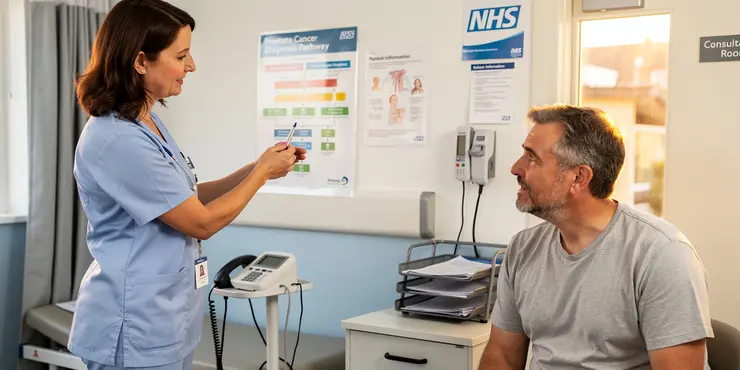
Prostate cancer diagnosis and tests
Relevance: 36%
-
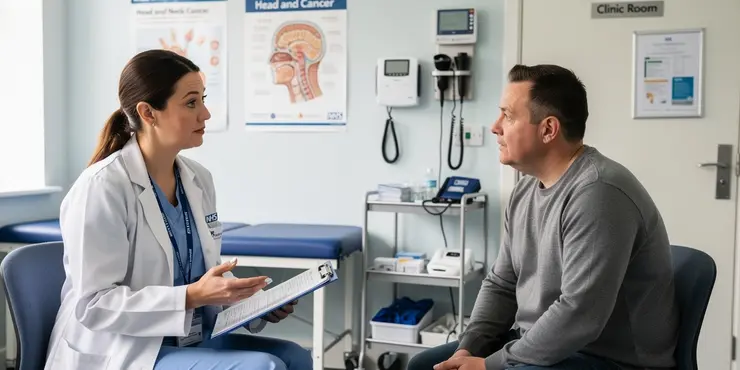
Head and Neck Cancer Diagnosis
Relevance: 35%
-
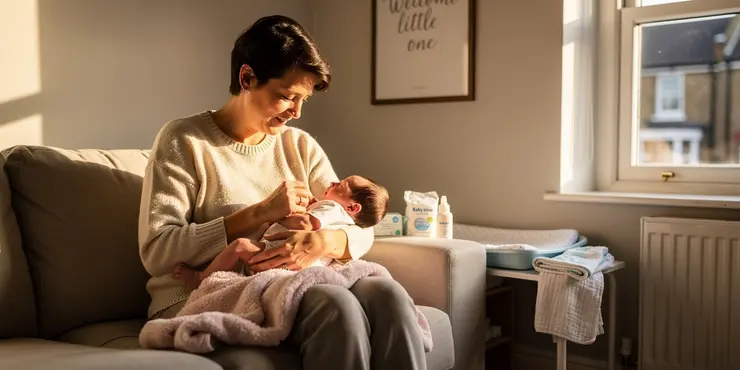
Are baby sleep pillows safe?
Relevance: 35%
-
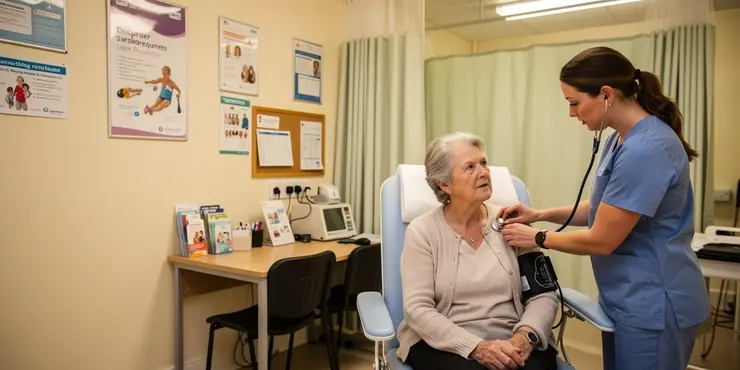
Is it safe to sleep after a concussion?
Relevance: 34%
-
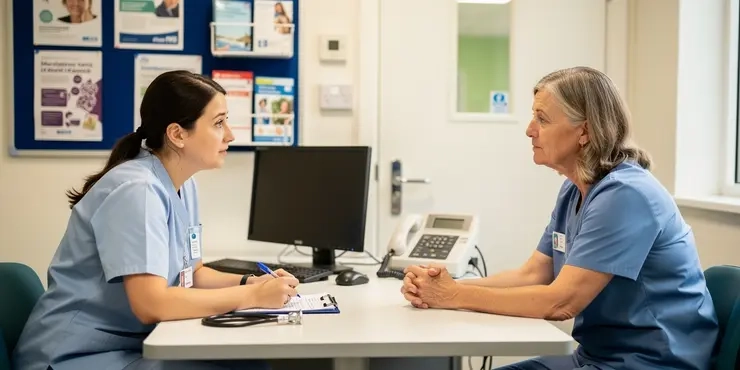
Attention deficit hyperactivity disorder (ADHD) - Diagnosis
Relevance: 34%
-
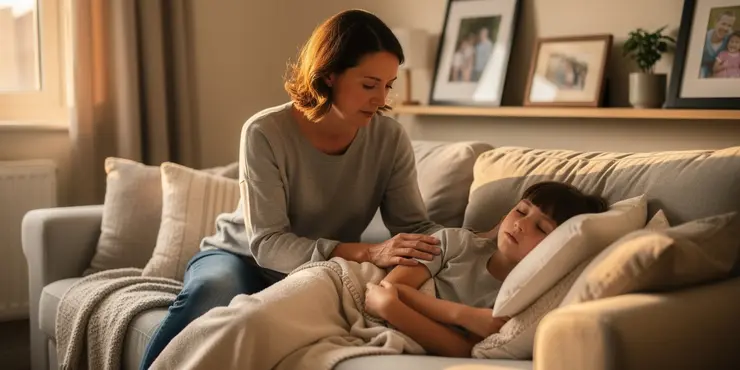
Is it safe to sleep after a concussion?
Relevance: 34%
-
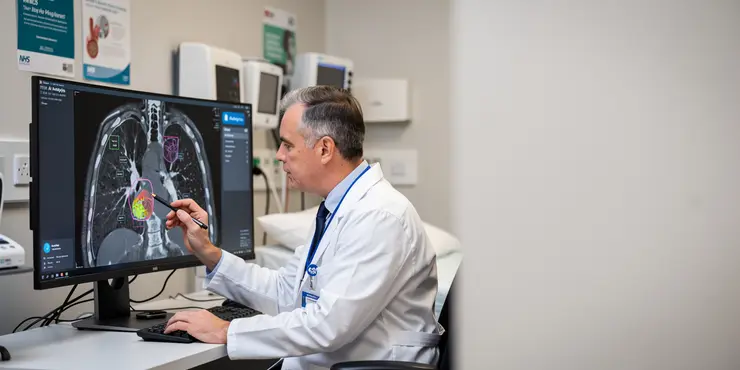
Are AI systems used alone in lung cancer diagnosis or alongside human radiologists?
Relevance: 34%
-
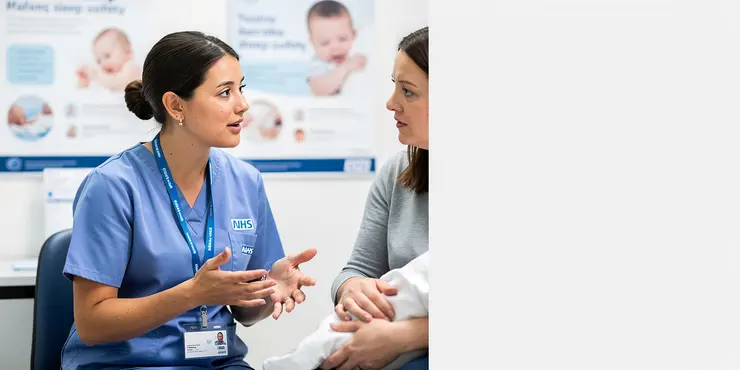
Is it okay to use a baby sleep positioner?
Relevance: 34%
Introduction to Sleep Apnea
Sleep apnea is a sleep disorder characterized by interruptions in breathing during sleep. These interruptions, called apneas, can occur multiple times throughout the night and may lead to disrupted sleep and a range of health issues. Diagnosing this condition is critical, and various methods are used to accurately identify sleep apnea in patients.
Initial Evaluation
The initial step in diagnosing sleep apnea usually involves a consultation with a general practitioner (GP) or a sleep specialist. During this evaluation, the doctor will take a detailed medical history and inquire about sleep patterns, daily habits, and any symptoms experienced during sleep, such as snoring, observed pauses in breathing, or excessive daytime sleepiness.
Physical Examination
A physical examination may be conducted to look for physical traits associated with sleep apnea, such as enlarged tonsils, a thick neck, or a narrow airway. The doctor may also check for signs of obesity, which is a significant risk factor for sleep apnea. Gathering this information helps to form a preliminary assessment of the likelihood of sleep apnea.
Sleep Studies
The definitive diagnosis of sleep apnea typically involves a sleep study, known as polysomnography. This can be conducted in a sleep laboratory or, alternatively, at home using portable devices. During a polysomnography study, various physiological parameters are monitored overnight, including brain activity, eye movements, heart rate, blood oxygen levels, and airflow, among others.
Laboratory-Based Polysomnography
In a sleep laboratory, patients are observed overnight while connected to monitoring equipment. This provides a comprehensive assessment of sleep cycles and disruptions. Sleep technologists will analyze the data collected to identify apneas and other sleep disorders. This method is considered the gold standard in sleep apnea diagnosis.
Home Sleep Apnea Testing
Home sleep apnea testing is an alternative diagnostic tool that allows patients to be monitored in the comfort of their own home. Although it is less comprehensive than laboratory-based tests, it is more convenient and can still provide valuable data for diagnosing moderate to severe sleep apnea. Patients are given portable equipment to record certain sleep parameters overnight.
Diagnosis and Follow-Up
Once the sleep study is complete, the results are reviewed by a sleep specialist who interprets the data to determine if sleep apnea is present and, if so, its severity. The diagnosis will guide treatment options, which can include lifestyle changes, continuous positive airway pressure (CPAP) therapy, or surgery in some cases. Follow-up appointments are important to monitor treatment effectiveness and make any necessary adjustments.
What Is Sleep Apnea?
Sleep apnea is a problem where people stop breathing for short times while they sleep. These stops in breathing are called apneas. They can happen many times at night. This can make sleep not restful and can cause health problems. It is important to find out if someone has sleep apnea. Doctors have different ways to check for it.
First Check-Up
The first step to find sleep apnea is to see a doctor. This doctor can be a general doctor or a special sleep doctor. The doctor will ask about health history, sleep habits, things during the day, and sleep problems like loud snoring, stopping breathing while sleeping, or feeling very sleepy in the day.
Checking the Body
The doctor might look for signs that can mean sleep apnea, like big tonsils, a thick neck, or a small airway. The doctor might also look for signs of being overweight, which can make sleep apnea more likely. This helps the doctor figure out if someone might have sleep apnea.
Sleep Tests
To know for sure about sleep apnea, doctors use a sleep test called polysomnography. This can be done in a special sleep clinic or at home with a small machine. The sleep test checks things like brain waves, eye movements, heart rate, breathing, and oxygen levels while you sleep.
Sleep Clinic Testing
In a sleep clinic, people stay overnight. They are connected to machines that watch their sleep. Experts look at the data to find apneas and other sleep problems. This is the best way to check for sleep apnea.
Testing at Home
People can also check for sleep apnea at home. They use a small machine to collect sleep data. This is not as complete as the sleep clinic test, but it is easier for many people. It can still help find moderate to severe sleep apnea.
What Happens After Testing?
After the sleep test, a sleep doctor looks at the results. The doctor checks if sleep apnea is there and how bad it is. This will help decide what treatment to use. Treatments might be changing habits, using a CPAP machine, or sometimes surgery. Follow-up visits make sure the treatment is working and can fix any problems.
Frequently Asked Questions
What is sleep apnea?
Sleep apnea is a sleep disorder characterized by repeated interruptions in breathing during sleep.
What are the common types of sleep apnea?
The common types of sleep apnea are obstructive sleep apnea, central sleep apnea, and complex sleep apnea syndrome.
What is a sleep study?
A sleep study, or polysomnography, is a test used to diagnose sleep disorders, including sleep apnea.
How is sleep apnea diagnosed?
Sleep apnea is typically diagnosed using a sleep study or home sleep apnea test that monitors breathing and other body functions during sleep.
What is polysomnography?
Polysomnography is a comprehensive overnight sleep study that records brain waves, oxygen levels, heart rate, and breathing while you sleep.
Can sleep apnea be diagnosed with a home test?
Yes, a home sleep apnea test is a simplified version of a polysomnography that can be used to diagnose obstructive sleep apnea.
What symptoms might indicate the need for a sleep apnea test?
Symptoms like loud snoring, gasping for air during sleep, and daytime fatigue suggest the need for a sleep apnea test.
Who is qualified to diagnose sleep apnea?
Sleep specialists, often board-certified physicians, are qualified to diagnose sleep apnea based on sleep study results.
What role does a sleep specialist play in diagnosing sleep apnea?
A sleep specialist analyzes the results from sleep studies and makes a diagnosis of sleep apnea if indicated.
How long does a sleep study take?
An overnight sleep study typically lasts about eight hours.
What is the difference between in-lab sleep studies and home sleep tests?
In-lab sleep studies are more comprehensive and monitor multiple parameters, while home tests are simpler and focus mainly on breathing patterns.
What criteria might lead a doctor to recommend a sleep study?
Persistent symptoms like severe snoring, observed apnea episodes, or excessive daytime sleepiness may lead to a recommendation for a sleep study.
Can sleep apnea be diagnosed based on symptoms alone?
No, a definitive diagnosis of sleep apnea requires a sleep study or objective testing.
What other conditions might be identified during a sleep study?
A sleep study can also identify other sleep disorders such as narcolepsy or periodic limb movement disorder.
What equipment is used in a home sleep apnea test?
Home sleep apnea tests typically use sensors to monitor airflow, breathing patterns, heart rate, and oxygen levels.
What should I expect during an in-lab sleep study?
During an in-lab study, you will sleep overnight in a clinic with sensors attached to monitor your sleep stages and physiological activity.
Can children have sleep apnea, and how is it diagnosed?
Yes, children can have sleep apnea, and it is diagnosed similarly with polysomnography, but a pediatric specialist may be involved.
How soon after a sleep study do results become available?
Sleep study results typically take one to two weeks as they need detailed analysis by a specialist.
Are there different severity levels for sleep apnea?
Yes, sleep apnea can be classified as mild, moderate, or severe based on the number of apnea events per hour.
Can lifestyle changes impact the diagnosis of sleep apnea?
Lifestyle changes won't alter the diagnosis but can help manage symptoms and improve sleep quality.
What is sleep apnea?
Sleep apnea is when you stop breathing for short times while you sleep. This can happen many times in one night.
If you have sleep apnea, you might feel very tired during the day because you did not get good sleep.
Some signs of sleep apnea are loud snoring or waking up a lot at night.
Using a CPAP machine can help. It helps you breathe better when you sleep.
Talk to a doctor if you think you have sleep apnea. They can help you find the right treatment.
Sleep apnea is when you stop breathing for short times while you sleep. This happens again and again.
What are the common types of sleep apnea?
Sleep apnea is when you stop breathing for short times while you sleep.
Here are the common types:
- Obstructive Sleep Apnea: This happens when your throat muscles relax too much.
- Central Sleep Apnea: This happens when your brain doesn’t send the right signals to the muscles that control your breathing.
- Complex Sleep Apnea Syndrome: This is a mix of obstructive and central sleep apnea.
If you think you have sleep apnea, talk to a doctor. You can also try using a simple breathing machine to help you sleep better.
There are three main types of sleep apnea:
1. Obstructive Sleep Apnea: This happens when something blocks your throat while you sleep.
2. Central Sleep Apnea: This is when your brain doesn’t send the right signals to help you breathe.
3. Complex Sleep Apnea Syndrome: This means you have both obstructive and central sleep apnea.
Helpful tools:
- Talk to a doctor to learn more.
- Use pictures or videos to see how these types work.
- Try sleep apps to help monitor your sleep.
What is a sleep study?
A sleep study is a test that helps doctors see how you sleep. It can show if you have problems during sleep. During the test, you sleep overnight at a special place. Doctors use machines to check how you breathe and move while you sleep.
If you have trouble sleeping, a sleep study can help find out why. It is safe and doesn't hurt.
If you have questions, you can talk to a doctor. You can also ask someone to help you understand the test.
A sleep study is a test that helps doctors find out if someone has problems sleeping, like sleep apnea. Sleep apnea is when a person stops breathing for short times while they sleep.
If you need help reading, try using tools like audiobooks or reading apps that read out loud. You can also ask someone to read with you and explain the words.
How do doctors know if someone has sleep apnea?
Doctors look at how you sleep and breathe. They use special tests to see if there are problems. Here are some things they might use:
- A sleep study in a clinic or at home. It checks your breathing while you sleep.
- A breathing monitor. This can track how many times you stop breathing while you sleep.
Doctors might use other tests too. Always talk to your doctor if you have trouble sleeping.
Doctors find out if someone has sleep apnea by doing a special sleep test. This test checks how you breathe and how your body works while you sleep. You can do this test at a sleep clinic or at home with a special kit.
What is polysomnography?
Polysomnography is a test. It looks at how you sleep. It checks your brain, heart, and breathing. It also checks how your body moves when you sleep.
If you want to know more, you can:
- Ask your doctor.
- Read picture books about sleeping tests.
- Watch videos for kids about sleeping tests.
Polysomnography is a big word for a sleep test. This test checks how you sleep overnight. It looks at your brain waves, oxygen, heart rate, and how you breathe.
If you find this hard to understand, you can ask someone to explain it in a different way. Listening to audio books or using speech-to-text tools can also help.
Can you find out if you have sleep apnea with a test at home?
Yes, you can use a simple test at home to check for sleep apnea.
If you think you have sleep apnea, talk to a doctor. They can help you get a home test kit.
The test kit will have a machine. It checks your breathing while you sleep.
Here are some tips to help:
- Ask someone to help you set up the test.
- Read the instructions carefully.
- Look for pictures that show you what to do.
A doctor will check the results. They will tell you if you have sleep apnea.
Yes, a home sleep test is a simple way to check if you have a sleep problem called obstructive sleep apnea.
Signs You Might Need a Sleep Apnea Test
Here are some signs that you might need a sleep apnea test:
- Loud snoring at night.
- Feeling very tired during the day.
- Stopping and starting breathing when you sleep.
- Waking up with a dry mouth or sore throat.
- Waking up a lot during the night.
If you notice these signs, tell a doctor. They can help you find out more. You can also ask someone who knows about sleep problems. Using a sleep journal to track your sleep can also help.
If you have signs like loud snoring, having trouble breathing while you sleep, or feeling really tired during the day, you might need to check for sleep apnea.
Who can say if someone has sleep apnea?
If you think you might have sleep apnea, it's important to talk to a doctor. A doctor can help you find out if you have it.
Here are some people who can help:
- Family Doctor: Your family doctor can talk to you about your sleep and might send you to a sleep specialist.
- Sleep Specialist: This is a doctor who knows a lot about sleep problems. They can do special tests to see if you have sleep apnea.
Support tools:
- Ask someone you trust to go to the doctor with you. They can help you remember what the doctor says.
- Bring a notebook to write down any important things the doctor tells you.
Doctors who know a lot about sleep can find out if you have sleep apnea. They look at sleep study results to do this.
What does a sleep doctor do to find out if you have sleep apnea?
A sleep doctor is a special doctor who helps people with sleep problems. They are good at finding out if you have sleep apnea. Sleep apnea is when you have trouble breathing while you sleep.
Here is how a sleep doctor might help:
- Talking with You: The doctor will ask you questions about your sleep. They will want to know if you feel very sleepy during the day or if you snore a lot at night.
- Sleep Study: They may have you do a sleep study. This means they look at how you sleep. You might do this at home or in a sleep clinic.
- Checking the Results: After the sleep study, the doctor will look at the results. They will see if you have sleep apnea.
- Helping You Get Better: If you have sleep apnea, the doctor will help you find ways to sleep better. This might be with a special machine or other tools.
If you find reading hard, here are some things that can help:
- Ask Questions: Always ask if you don't understand something.
- Use Pictures: Sometimes pictures or videos can help you understand better.
- Take Your Time: It's okay to take your time when reading.
A sleep doctor looks at sleep test results. The doctor will say if someone has sleep apnea.
How long will a sleep study last?
A sleep study usually takes one night. You will sleep at a special place where they can watch how you sleep. This helps doctors learn more about your sleep.
If you have trouble reading, you can:
- Ask someone to read the information for you.
- Use a reading app that reads text out loud.
A sleep study at night usually takes around eight hours.
How are in-lab sleep studies different from home sleep tests?
Sleep studies in a lab are more detailed. They check lots of things. Home tests are easier and mostly look at how you breathe.
Why might a doctor say you need a sleep test?
Some signs you might have a sleep problem are loud snoring, stopping breathing while asleep, or feeling very sleepy during the day. If you have these, doctors might suggest doing a sleep study to check.
Can doctors tell if you have sleep apnea just by looking at your symptoms?
Doctors need more than just symptoms to say if you have sleep apnea. They often use a special test called a "sleep study" that checks how you breathe while you sleep.
If you think you have sleep apnea, it's a good idea to talk to a doctor. They can help you figure out what tests you might need.
Tools like bedtime routines, relaxing music, and breathing exercises can help make sleep better, but they don't replace a doctor's advice.
No, you need a special test to know for sure if you have sleep apnea.
What else can a sleep study find out about your health?
A sleep study is a way to find out if someone has other sleep problems. These problems can be things like narcolepsy, which makes people very sleepy during the day, or periodic limb movement disorder, which makes a person's legs or arms move while they are asleep.
What do you need for a home sleep apnea test?
To do a sleep apnea test at home, you need some special tools. Here is what you use:
- A small device to check your breathing while you sleep.
- A belt to go around your chest or tummy. It helps the device know how you are breathing.
- A clip for your finger to see how much oxygen is in your blood.
These tools help your doctor understand how you sleep and if you might have sleep apnea.
You can ask someone to help you set up the test at home if you need it. Make sure to read the instructions or ask a doctor or nurse to explain them to you.
Home sleep apnea tests use special tools to check how you breathe while you sleep. They look at how air moves in and out, your breathing patterns, how fast your heart is beating, and how much oxygen is in your blood.
What happens in a sleep study at the lab?
When you have a sleep study at the lab, you might feel curious or a bit worried about what will happen. Here is what you can expect:
You will stay overnight at a special sleep lab. It is like a bedroom. You will go there in the evening and can bring your own pajamas.
A person at the lab will gently attach small sensors to your skin. These sensors help check how you sleep. They look at things like your breathing, heartbeat, and how much you move.
Once everything is ready, you will go to sleep in the lab bed. The sensors do not hurt, and you can still move around. The people at the lab are there to help if you need anything.
The next morning, when you wake up, the sensors are taken off. You will learn more about how you slept and what that means for your health.
If you have questions, it can help to talk to someone you trust or write them down to remember. Books or videos about sleep studies can also be helpful.
In a special sleep study, you will sleep overnight at a clinic. They will put small sensors on you to check how you sleep and how your body works while you sleep.
Can children have sleep apnea, and how do doctors find out?
Yes, children can have sleep apnea. This means they have trouble breathing when they sleep.
Doctors check for sleep apnea by doing a sleep study. This means they watch how the child sleeps at night. Sometimes, they use machines to help them understand the child's breathing.
If you think a child has sleep apnea, talk to a doctor. They can help.
Yes, kids can have sleep apnea.
How do doctors find out?
Doctors use a special test called polysomnography to see if a child has sleep apnea. Sometimes, a special doctor for kids helps too.
When will you get the results from your sleep study?
After you have a sleep test, you might wonder when you will know the results.
It can take a few days to get your sleep study results.
The doctor will look at your test and tell you what they find.
If you have questions, write them down so you can ask your doctor.
Having someone with you can help when talking to the doctor.
It usually takes 1 to 2 weeks to get sleep study results. A sleep expert needs time to look at the details carefully.
Are there different levels of how bad sleep apnea can get?
Sleep apnea can be mild, moderate, or severe. That means it can be a little problem, a bigger problem, or a really big problem.
To help, you can:
- Use pictures to understand the levels.
- Talk to a doctor or nurse.
- Watch videos that explain sleep apnea.
Yes, sleep apnea can be mild, moderate, or severe. This depends on how many times it happens each hour.
Can changing your habits help with sleep apnea?
Changing how you live can't change what the doctor says, but it can help you feel better and sleep better.
Useful Links
This website offers general information and is not a substitute for professional advice.
Always seek guidance from qualified professionals.
If you have any medical concerns or need urgent help, contact a healthcare professional or emergency services immediately.
Some of this content was generated with AI assistance. We’ve done our best to keep it accurate, helpful, and human-friendly.
- Ergsy carfully checks the information in the videos we provide here.
- Videos shown by Youtube after a video has completed, have NOT been reviewed by ERGSY.
- To view, click the arrow in centre of video.
- Most of the videos you find here will have subtitles and/or closed captions available.
- You may need to turn these on, and choose your preferred language.
- Go to the video you'd like to watch.
- If closed captions (CC) are available, settings will be visible on the bottom right of the video player.
- To turn on Captions, click settings .
- To turn off Captions, click settings again.
More Items From Ergsy search
-

How is sleep apnea diagnosed?
Relevance: 100%
-

What is sleep apnoea?
Relevance: 97%
-

What is sleep apnea?
Relevance: 97%
-

Why is sleep apnea dangerous?
Relevance: 94%
-

What is complex sleep apnea syndrome?
Relevance: 94%
-

How common is sleep apnea?
Relevance: 93%
-

Can sleep apnea be cured?
Relevance: 93%
-

What are the main types of sleep apnea?
Relevance: 91%
-

What are common symptoms of sleep apnea?
Relevance: 91%
-

Can children have sleep apnea?
Relevance: 90%
-

Does sleep apnea occur only in adults?
Relevance: 90%
-

What is complex sleep apnea syndrome?
Relevance: 90%
-

Is CPAP the only treatment for sleep apnea?
Relevance: 88%
-

What treatments are available for sleep apnea?
Relevance: 88%
-

What should I do if I suspect I have sleep apnea?
Relevance: 88%
-

What causes obstructive sleep apnea?
Relevance: 87%
-

What are risk factors for developing sleep apnea?
Relevance: 87%
-

Can alcohol worsen sleep apnea?
Relevance: 86%
-

Is snoring always a sign of sleep apnea?
Relevance: 85%
-

Can weight loss improve sleep apnea?
Relevance: 83%
-

Am I eligible to try the new sleep apnea chip?
Relevance: 82%
-

How does the new Sleep Apnea Chip work?
Relevance: 79%
-

What lifestyle changes can help manage sleep apnea?
Relevance: 78%
-

Introduction to obstructive sleep apnoea
Relevance: 71%
-

Evidence-Based Interventions: snoring surgery in the absence of Obstructive Sleep Apnoea (OSA)
Relevance: 60%
-
What is sleep apnoea?
Relevance: 48%
-

How does central sleep apnea differ from obstructive sleep apnea?
Relevance: 43%
-

The Importance of Sleep for All Ages
Relevance: 39%
-
How does sleep quality relate to menopause symptoms?
Relevance: 38%
-

BSL - Diagnosis of panic disorder
Relevance: 37%
-

Does screen time affect both sleep onset and sleep maintenance?
Relevance: 36%
-

Top Tips to Help You Get a Good Nights Sleep
Relevance: 36%
-

Prostate cancer diagnosis and tests
Relevance: 36%
-

Head and Neck Cancer Diagnosis
Relevance: 35%
-

Are baby sleep pillows safe?
Relevance: 35%
-

Is it safe to sleep after a concussion?
Relevance: 34%
-

Attention deficit hyperactivity disorder (ADHD) - Diagnosis
Relevance: 34%
-

Is it safe to sleep after a concussion?
Relevance: 34%
-

Are AI systems used alone in lung cancer diagnosis or alongside human radiologists?
Relevance: 34%
-

Is it okay to use a baby sleep positioner?
Relevance: 34%


